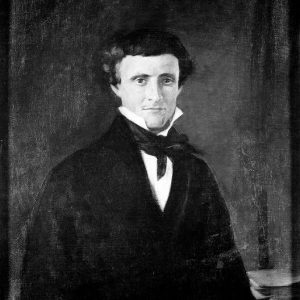calsfoundation@cals.org
George Claibourne Watkins (1815–1872)
George Claibourne Watkins was a prominent attorney in nineteenth-century Arkansas. His partnership with Chester Ashley is one of the roots from which one of the state’s most respected firms, the Rose Law Firm, grew. In addition to his role in the development of the firm, Watkins also served briefly as chief justice of the Arkansas Supreme Court.
George C. Watkins was born on November 25, 1815, in Shelbyville, Kentucky, to Isaac Watkins and Marie Toncray Watkins. In late 1820, seeking new opportunities, the family set out for the newly opened territory of Arkansas. They arrived in March 1821, and, settling in what would become Little Rock (Pulaski County), the family quickly earned a place among the town’s most prominent early citizens.
After spending his early years in Arkansas, Watkins was sent to Litchfield, Connecticut, to study law at a well-regarded local academy; he completed his studies at Yale. Watkins returned to Arkansas in 1837 and entered into a law partnership with Chester Ashley, whose original partnership with the well-connected Robert Crittenden had dissolved over political differences. No such issues arose between Watkins and Ashley, and their partnership flourished until Ashley was elected to the U.S. Senate in 1844. At that point, Watkins started a new practice, setting up a partnership with James Moore Curran.
Watkins married Mary Adams Crease on June 28, 1841. She died in 1855 in Little Rock. Later that year, Watkins married Sophia Fulton Curran, the widow of his former partner Curran, who had died suddenly in October 1854; she was also the daughter of the former territorial governor William Fulton. The couple lived for a time in Little Rock in the house known as Curran Hall, which James Curran had purchased for his wife in 1849.
While the Des Arc Bayou area had been settled in the first decades of the nineteenth century, Watkins, along with James Erwin, is credited with having laid out the original plot of Des Arc (Prairie County) in 1848; they are considered the founders of the town. After its incorporation in 1854, Des Arc became an important stop for steamboats.
Such efforts were only a sideline to Watkins’s real passion, the practice of law. He established a reputation as one of the state’s most respected attorneys, with many of the state’s business and political leaders coming to him for counsel.
Watkins served as state attorney general from 1848 until 1851. However, his primary focus continued to be his private practice until 1853, when the Arkansas General Assembly elected him to the position of chief justice of the Arkansas Supreme Court, a post he held until December 31, 1854. While his tenure on the bench was short, it was not inconsequential. He is credited with bringing a new sense of organization to the court, helping to bring it up to date in its operations and case load. In addition, his legal work earned the respect of lawyers and citizens across the state. Upon the death of his partner James Curran in 1854, however, he had to resign so that he could attend to his law firm.
The onset of the Civil War interrupted his law practice. His three sons, including second son and namesake Claibourne Watkins, all served in the Confederate army, and Watkins was a delegate to the Arkansas Secession Convention. He supported the state’s decision to secede and served as the convention’s president in the gathering’s waning days. His early involvement with secession, coupled with his ongoing support of the rebellion, required him to seek a presidential pardon at war’s end, which he received in July 1865.
Later in 1865, following his pardon, Watkins created a new law partnership with Uriah M. Rose. While the new partnership, now known as the Rose Law Firm, grew, Watkins faced recurring health problems, which became so problematic that they forced his retirement in 1872.
Watkins undertook extensive efforts to address his deteriorating health, with forays to the springs of Virginia and the mountains of Colorado. With his health-based travel taking him away from the city, Watkins reduced some of his ties to Little Rock, and in early 1872, he sold the plot of land upon which would soon be built the city’s Capital Hotel. During a trip back home from Colorado, Watkins died in St. Louis, Missouri, on December 7, 1872. He is buried in Mount Holly Cemetery in Little Rock.
For additional information:
Hallum, John. Biographical and Pictorial History of Arkansas. Albany, NY: Week, Parson and Co., 1887.
“Judge George Claibourne Watkins.” Find-a-Grave. http://www.findagrave.com/cgi-bin/fg.cgi?page=gr&GRid=7636432 (accessed October 6, 2020).
“Our History.” Rose Law Firm. https://www.roselawfirm.com/about/ (accessed October 6, 2020).
“Watkins Family.” Our Southern Cousins. http://oursoutherncousins.com/watkins12.html (accessed October 6, 2020).
William H. Pruden III
Ravenscroft School
 Law
Law Louisiana Purchase through Early Statehood, 1803 through 1860
Louisiana Purchase through Early Statehood, 1803 through 1860 Politics and Government
Politics and Government George C. Watkins
George C. Watkins 



Comments
No comments on this entry yet.